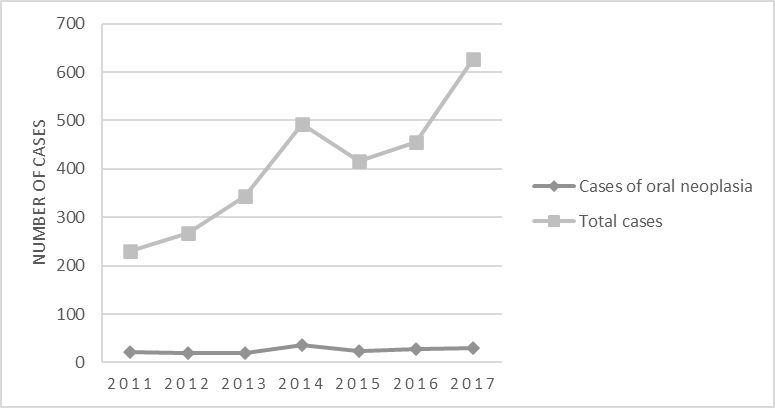Occurrence of oral cavity neoplasms in canines attended at the oncology service of the Federal Rural University of Rio de Janeiro (2011 to 2017)
DOI:
https://doi.org/10.21708/avb.2020.14.3.9328Resumo
The oral cavity is among the main sites of neoplasia, both benign and malignant. Those with characteristics of malignancy have an unfavorable prognosis due to their biological behavior and diagnostic and therapeutic difficulties. Epidemiological data are important to profile the affected population and establish an early treatment strategy, optimizing treatment and increasing the chances of cure and quality of life. The objective of this study was to present the clinical epidemiological aspects of dogs treated with neoplasms in the oral cavity at the Oncology Service of the Veterinary Hospital of the Federal Rural University of Rio de Janeiro between the years 2011 and 2017 through a retrospective study of all the medical records of the respective service. The epidemiological data extracted from the archives showed that out of 2832 cases of neoplasms treated in the oncology sector over a 7-year interval (2011 to 2017), 176 animals (6.21%) were affected by oral cavity neoplasms. The dogs without a defined breed were the most affected, the main site affected was the maxilla and melanoma was the most prevalent neoplasm.
Downloads

Downloads
Publicado
Edição
Seção
Licença
Autores que publicam na Acta Veterinaria Brasilica concordam com os seguintes termos: a) Autores mantém os direitos autorais e concedem à revista o direito de primeira publicação, com o trabalho simultaneamente licenciado sob a Licença Creative Commons Attribution que permite o compartilhamento do trabalho com reconhecimento da autoria e publicação inicial nesta revista. b) Autores têm autorização para assumir contratos adicionais separadamente, para distribuição não-exclusiva da versão do trabalho publicada nesta revista (ex.: publicar em repositório institucional ou como capítulo de livro), com reconhecimento de autoria e publicação inicial nesta revista. c) Autores têm permissão e são estimulados a publicar e distribuir seu trabalho online (ex.: em repositórios institucionais ou na sua página pessoal) a qualquer ponto antes ou durante o processo editorial, já que isso pode gerar alterações produtivas, bem como aumentar o impacto e a citação do trabalho publicado (Veja O Efeito do Acesso Livre).


 Esta obra está licenciada com uma Licença
Esta obra está licenciada com uma Licença 